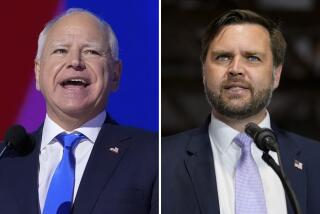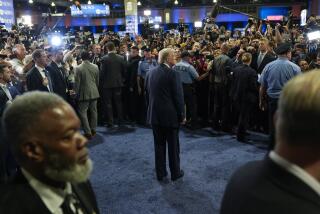Gore and Perot Agree to Debate Free Trade Pact
WASHINGTON — Vice President Al Gore and billionaire Ross Perot agreed Friday to a televised debate Tuesday night on the North American Free Trade Agreement, a match-up widely read as a sign of deepening White House concern about support for the accord.
Gore and the trade agreement’s most visible opponent are scheduled to appear for 90 minutes on Cable News Network’s “Larry King Live” program at 6 p.m. PST.
White House officials said that they sought the debate because of a perceived need to attack Perot’s credibility one week before Congress is to vote on the treaty--and just as the former independent presidential candidate begins an intensive advertising campaign aimed at derailing the agreement.
By debating the leader of opposition to the trade pact who has the most appeal for anxious working-class Americans, the White House hopes to provide crucial political backing for undecided members of Congress who are debating whether to risk supporting the agreement, aides said.
“He’s a wild card out there that we just have to deal with,” said one Administration aide. “It is important to get out in front of that and put up a fire wall and counter the false information he’s putting out.”
Perot said that the White House insisted on a studio setting for the debate because it is afraid to make its arguments before ordinary citizens who oppose the trade agreement.
“There is an absolute fear of facing a huge audience of working Americans,” he said in a televised statement at midday Friday. “They’ve got to face the people on this one. The people don’t buy it. Even after all the side deals they’ve cut, the people don’t buy it.”
Administration officials asserted that polls show the views of those who oppose the agreement can be changed with factual arguments about the merits of the accord, which would phase out trade barriers with Canada and Mexico.
But some members of Congress who support the trade pact said that they fear the debate could cause a surge in Perot’s popularity similar to that which followed his first television campaign debate with Clinton and then-President George Bush. Several said that they fear the debate plan could do its greatest harm simply by signaling new desperation at the White House.
Others worried about the choice of Gore--widely seen as a somewhat stiff embodiment of the Washington Establishment, rather than a debater with a common touch--to take on Perot, an acknowledged master of the sarcastic sound bite.
Some said that they also see the maneuver as a sign that recent White House efforts to win support for NAFTA in the House by cutting special deals are not bearing fruit.
“This is a high-risk strategy,” one Republican aide said.
Supporters and doubters agreed, however, that the encounter is likely to be a lively--and perhaps even outrageous--hiatus in what has been a sober discussion of the trade pact.
President Clinton, for his part, insisted that the decision to accept Perot’s challenge to debate is a sign of the Administration’s confidence.
“I think the more people know, the more they’ll be for it,” Clinton told reporters, adding that Gore would be more than a match for the quick-tongued Dallas billionaire.
“When he went on David Letterman, I knew that he (Gore) could pick up Ross Perot on one-liners,” the President said, referring to an appearance by the vice president on the late-night talk show in September.
Clinton said that while the Administration was making progress in lining up congressional votes for the pact, many lawmakers had complained that they are under tremendous pressure in their districts from organized labor and other groups opposed to the agreement. He said that he believes it is necessary for the White House to reach a wider audience and that the debate would accomplish that.
An Administration official said that independent polls indicate opposition to the trade agreement is falling as Americans learn more about it. He cited one poll three weeks ago showing that 75% of Americans believed that it would cost American jobs; the same organization found that the number had fallen below 50% by last Friday.
Rep. Bill Richardson (D-N.M.), chief House vote-counter on the trade agreement for the Democrats, said that the debate strategy is aimed at a core of about 40 undecided Democratic votes. But he acknowledged that the Administration is lagging in its vote-getting effort, and that the debate carries risks.
“When you’re behind you have to have a high-risk strategy,” he said. “You have to roll the dice when you’re behind. This gamble is worth it,” he said.
Rep. Robert T. Matsui (D-Sacramento), another leader of the effort, said that the Administration and its supporters decided to debate Perot because he recently has avoided any forum, including television news programs, where he could be attacked. “He stays away from anything where he might be challenged,” Matsui said.
And he noted signs that Perot’s appeal might be lagging. These include a decline in Perot’s polling numbers and spotty attendance at some of his rallies. One rally last month drew only about 250 people in Rosemont, Ill., near Chicago; a Detroit rally that backers said would bring out 10,000 people drew only about 1,500.
But some political and media analysts questioned the White House move. They said that Gore will need to have a better command of the facts than Perot and at least match him in catchy phrase-making to win.
Edward J. Rollins, a GOP strategist who worked for Perot briefly last year, predicted that the debate will help those who oppose the trade agreement.
“Now Perot, who can’t get on television, is going to be featured for the next two or three weeks. And I think he wins the game,” Rollins said in a television interview.
Kathleen Hall Jamieson, a specialist in communications and debates at the University of Pennsylvania, hailed the debate as valuable for public understanding, but pointed to the unevenness of the match-up.
“Perot is good at this; Gore isn’t,” she said. And even should Gore show a firmer grasp of the issues, “if he doesn’t have the sound bites, the press is going to declare him the loser,” she declared.
She contended that Gore was outperformed by former Vice President Dan Quayle on environmental issues during last year’s vice presidential debate, even though Gore is especially knowledgeable on the environment.
The details of the debate were announced after an exchange of verbal volleys between the White House and Perot camps that lasted most of the day.
Perot had sought three debates, beginning with a match at a Tampa, Fla., rally he had scheduled for Sunday; Gore wanted the discussion on neutral territory.
Perot said that the White House demands on the debate format are “like the town bully challenging you to a fight” and then setting out a dozen conditions for the brawl.
“Let’s just get it out in the open,” Perot said.
The Texas billionaire then offered “one more concession” to assure that the debate takes place.
“If they won’t come one at a time and take on this issue, both the President and vice president can show up and I’ll take them on two to one,” he said. “If they still won’t do it, they can bring their speech writers up on the stage and actually let them come up to the podium and add comments if they need to. And finally, if they need their spin master, bring him, too.
“At that point, it’s four to one,” Perot said.
In a conference call with farmers and farm radio broadcasters, Clinton repeated many of his previous arguments for the three-nation trade pact and added a new one. Noting that he will travel to Seattle immediately after the scheduled Nov. 17 vote on the issue for an economic meeting with Asian leaders, Clinton said that a defeat on the trade accord would be a blow to American credibility.
“And, again, if NAFTA passes, I’ll have a lot of leverage in dealing with that,” Clinton said. “If it doesn’t pass, it’ll make it more difficult for me to argue that the United States is trying to lead a big, broad-based coalition of trading nations.”
Times staff writer Karen Tumulty contributed to this story.
Going Head to Head Over NAFTA
Vice President Al Gore will debate Ross Perot next week over the North American Free Trade Agreement, which is now before Congress.
PRO: The Administration’s Side
Dropping trade barriers with Mexico and Canada would create the world’s largest and richest trading bloc. Markets for autos, farm products, banking and other U.S. goods and services would balloon. If the U.S. doesn’t trade with Mexico, then Japan will.
CON: Perot’s Side
U.S. companies would set up operations in Mexico to take advantage of Mexico’s cheap labor market. This would cost hundreds of thousands of American jobs. He used the phrase “a giant sucking sound” to describe the flight of U.S. jobs to Mexico.
The Debate
When: Tuesday
Time: 6 p.m. PST
Place: CNN
Moderator: Larry King
Format: Debate will last 90 minutes and include calls from viewers.
Background on the Trade Agreement
What it would do: Eliminate tariffs and other trade barriers between the United States, Mexico and Canada
Potential trading bloc: 360 million people
Tariffs: Would be eliminated over 15 years, with industries that suffer the most from import competition given the most time to adjust.
Next step: Key House vote scheduled for Nov. 17
Outlook: By most counts, President Clinton is 40 or more votes short in the House. A heavy White House lobbying effort over the past few days has produced few converts.
Sources: Times staff and wire reports
More to Read
Get the L.A. Times Politics newsletter
Deeply reported insights into legislation, politics and policy from Sacramento, Washington and beyond. In your inbox three times per week.
You may occasionally receive promotional content from the Los Angeles Times.










